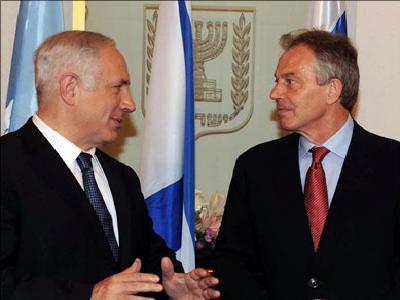
By Dr. Daud Abdullah
Do Tony Blair’s shuttle visits to Doha for meetings with the leadership of the Islamic Resistance Movement — Hamas — mean that he is about to befriend the Palestinian group? The short answer is no, with a capital “N”. They must not for one moment be interpreted as a change of heart or political conversion, not even in light of the fact that there are no permanent friends or enemies in politics. In this instance, it is all about the interests of those involved.
In spite of his failure as the Middle East Quartet’s peace envoy, the former British prime minister still enjoys the trust and confidence of the Israeli establishment. His current efforts are by no means part of the so-called “peace process”, even though he would have preferred some sort of link. They are, instead, limited to securing an agreement with the resistance factions in the Gaza Strip, and Hamas in particular.
In reality, the issues under discussion are very much the same that were agreed upon after the previous three Israeli offensives against the Gaza Strip. Though guaranteed by Egypt on every occasion, not one of these was fully implemented.
Perhaps all that has changed is that the situation on the ground for the Palestinians in Gaza has worsened beyond measure, thus forcing Hamas to explore the Blair initiative. The movement’s basic demands, however, remain unchanged: an end to the siege, a permanent opening of the border crossings, the flow of humanitarian aid and construction materials to be allowed to enter the enclave.
As in 2014, the current discussions are also about the establishment of a sea corridor from Cyprus and Greece to Gaza’s port. Reports that Israel has agreed to this in principle must be taken with a pinch of salt. The coalition government in Tel Aviv is dominated by religious fanatics and racial supremacists of the Israeli far-right, and it is questionable whether they would ever support any of the above, let alone open access by sea.
On balance, though, the objective of having a sea corridor to Gaza should not be abandoned, given that the Egyptians are unlikely to open the Rafah crossing permanently. There are two reasons for Cairo’s stance. The first relates to the security situation in the Sinai and the second to Gaza itself. The Palestinian issue is, arguably, the most potent instrument of leverage that the Egyptian regime can use to exert regional influence. As such, it will not make any concessions today or any time in the foreseeable future.
For its part, the Netanyahu government desperately wants to restore some semblance of normality to its southern border with Gaza. The current state of no war, no peace has left settlers in the area living in uncertainty. They hold their government responsible for their never-ending dread.
It is in this context that Blair’s initiative becomes important. If there is anything that could reassure the Israelis it is the disarmament of the resistance factions in Gaza; Netanyahu has made this demand after every Israeli war on the enclave but has failed to achieve it.
So far, there is nothing to suggest that Blair will succeed on this issue. Sources close to the Doha discussions told MEMO that the any talk of Hamas “decommissioning” its weapons (to use Blair’s Northern Ireland phrase) is off the table. On the contrary, the movement has no intention of curtailing the development of its military capability. The announcement last week that it has put into service a captured and repaired Israeli drone speaks volumes.
Despite the huge gap between the parties there is no doubt that the Blair talks have had some positive outcomes, albeit limited. For a start, it has broken the diplomatic blockade that has been imposed on Hamas for the better part of the past decade. Moreover, it is clear that whatever political or security changes are planned for the region’s future, they will have to take into account the movement’s legitimate demands.
Deep within himself Tony Blair must be agonising over his current role; he is having to deal with an organisation that he once helped to proscribe in Europe. Who would have thought that he would sit down with Khaled Meshaal without Hamas having first implemented the Quartet’s infamous preconditions of the recognition of the state of Israel, adherence to previous diplomatic agreements, and renunciation of violence as a means of achieving its goals?
After trying everything from assassinations to blockade and war, Hamas has not disappeared. There is still no love lost between the movement and its regional and international adversaries, so the issue today is certainly not about friendship. It is simply about attesting to the failure of a discredited policy of blockading and isolating arguably the major player in Palestinian politics, leading to years of wasted opportunities to make progress. It’s never too late to make a new beginning, though, and now would be a very good time to do it.
(This article was first published in Middle East Monitor)





Hamas should be very wary of any rapprochement with an envoy who puts Israel’s interests above anything else. Those with whom he played footsie in the past met their Creator prematurely, e.g Ghaddafi.